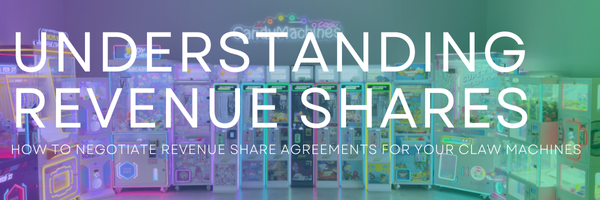How to Negotiate Revenue Share Agreements for Your Claw Machines
Sep 16, 2025
More Machines. More Savings. View Pricing Tiers →
If you are already registered, please log in.
We've made some exciting changes! NOTE: IF YOU HAD AN ACCOUNT PRIOR TO 12/06/2020, please checkout as GUEST and create a new account and request that your old orders be linked to your new account.
Create your account and enjoy a new shopping experience.
Create A New Account
Securing prime locations for claw machines is one of the most important aspects of running a successful vending business. While some locations may allow machine placement for a flat rental fee, many operate on a revenue-sharing model, where a percentage of earnings is split between the vending operator and the location owner. Negotiating favorable revenue share agreements is crucial for maintaining profitability while ensuring a mutually beneficial partnership. This guide explores key strategies for negotiating and structuring revenue share agreements that work for both parties.
A revenue share agreement determines how earnings from a claw machine are split between the operator and the business hosting the machine. These agreements vary based on factors such as location type, expected foot traffic, and the level of involvement required from the location owner.
Revenue splits typically fall within the following ranges:
The goal of negotiation is to reach an agreement that ensures profitability for the vending operator while providing enough incentive for the location owner to host the machine.
Before negotiating revenue share, it’s important to assess whether a location is worth pursuing. Not all locations will generate enough revenue to justify a significant revenue split. When evaluating potential locations, consider:
Conducting test runs or negotiating trial periods can help determine the viability of a location before committing to a long-term agreement.
When approaching a business owner about placing a claw machine, it’s important to frame the conversation in a way that highlights the mutual benefits. Many business owners are hesitant to commit to hosting vending machines due to concerns about space, maintenance, or interference with existing operations. Addressing these concerns in your pitch improves your chances of securing a favorable deal.
Key points to emphasize include:
Being prepared with data, such as estimated earnings based on similar locations, can also strengthen your proposal and build confidence in the agreement.
Once interest has been established, the negotiation phase begins. While some business owners may be familiar with revenue share agreements, others may not fully understand how they work. Transparency and flexibility are key to reaching a mutually beneficial agreement.
During negotiations, vending operators should be aware of common mistakes that can lead to unprofitable agreements:
Securing a favorable revenue share agreement is just the first step—maintaining a strong partnership with the business owner ensures long-term success. Providing excellent service, keeping machines stocked with attractive prizes, and regularly communicating with the location owner builds trust and increases the likelihood of securing additional placements in the future.
Offering promotional incentives, such as special discounts for store customers or occasional prize upgrades, can further enhance the value of the partnership. By treating the location owner as a business ally rather than just a host, vending operators can create a win-win arrangement that benefits both parties.
Negotiating revenue share agreements for claw machines requires a balance between maximizing profitability and offering enough incentive for business owners to host your machines. By selecting high-potential locations, presenting a compelling value proposition, and structuring agreements with clear, fair terms, vending operators can secure profitable partnerships that drive long-term success. With the right negotiation approach, claw machine businesses can thrive while benefiting the locations they serve.